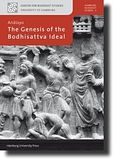The Genesis of the Bodhisattva Ideal
Anālayo:
The Genesis of the Bodhisattva Ideal / Anālayo. - Hamburg : Hamburg University Press, Verlag der Staats- und Universitätsbibliothek Hamburg Carl von Ossietzky, 2010. - 177 S. - (Hamburg Buddhist Studies ; 1)
ISBN 978-3-937816-62-3 (Print-Ausg.)
EUR 22,80
DDC: 294.34213; 294.3444
URN: urn:nbn:de:gbv:18-3-1036 [Onlineveröffentlichung, PDF-Format]
Beschreibung
In this book, Bhikkhu Anālayo investigates the genesis of the Bodhisattva ideal, one of the most important concepts in the history of Buddhist thought. He brings together material from the corpus of the early discourses preserved mainly in Pāli and Chinese that appear to have influenced the arising of the Bodhisattva ideal. Anālayo convincingly shows that the early sources do not present compassionate concern for others as a motivating force for the Buddha’s quest for awakening. He further offers an analysis of the only reference to Maitreya in the Pāli canon, showing that this reference is most likely a later addition. In sum, Bhikkhu Anālayo is able to delineate a gradual genesis of central aspects of the Bodhisattva ideal by documenting (1) an evolution in the Bodhisattva concept reflected in the early discourses, (2) the emergence of the notion of a vow to pursue the path to Buddhahood, and (3) the possible background for the idea of a prediction an aspirant to Buddhahood receives from a former Buddha.
Inhalt
List of Figures. 7
Foreword / Michael Zimmermann. 9
Introduction. 11
1. Gautama as a Bodhisattva. 15
2. Meeting the Previous Buddha. 55
3. The Advent of the Next Buddha. 95
Conclusion. 129
Abbreviations. 133
References. 135
Index. 173
Autor
BHIKKHU ANĀLAYO was born in Germany in 1962 and ordained in Sri Lanka in 1995. In the year 2000 he completed a Ph.D. thesis on the Satipaṭṭhāna-sutta at the University of Peradeniya (published 2003 by Windhorse in the UK). In the year 2007 he completed a habilitation research at the University of Marburg, in which he compared the Majjhima-nikāya discourses with their Chinese, Sanskrit, and Tibetan counterparts (forthcoming with Dharma Drum Publishers in Taiwan). At present, he teaches at the Center for Buddhist Studies, University of Hamburg, and researches at Dharma Drum Buddhist College, Taiwan. Besides his academic activities, he regularly conducts meditation courses in Sri Lanka. Mitarbeiterprofil, Zentrum für Buddhismuskunde.
Quellen: Hamburg University Press; Zentrum für Buddhismuskunde, Universität Hamburg; Deutsche Nationalbibliothek
Ähnlich
- Therigatha
- Women in Early Indian Buddhism
- Rakow: Transformationen des tibetischen Buddhismus
- De Chiara: The Khotanese Sudhanāvadāna ... 2
- Tiso: Liberation in One Lifetime
- Dalai Lama V.: The Illusive Play
- Vinaya Texts
- Bhikkhu-Vibhanga
- Marciniak: Studia nad Mahavastu
- Schmithausen: The Genesis of Yogācāra-Vijñānavāda

